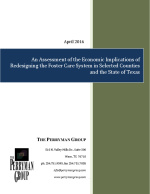An Assessment of the Economic Implications of Redesigning the Foster Care System in Selected Counties and the State of Texas
Published on April 22, 2016

More than 16,000 Texas children are presently in foster care. This crucial safety net for thousands of the state's most vulnerable residents has experienced challenges in recent years and is in the process of evolving in an innovative manner to better meet the needs of the affected young people at a critical juncture in their lives. While the primary consideration in any conversation related to transforming the foster care system must always be the well-being of the children and families who are affected, improvements also involve quantifiable economic benefits in the form of reduced social costs and increased earnings and productivity. Analyzing these economic benefits can help inform discussion of future strategic plans, particularly given the reality of tight budgets for social services.
While the primary consideration in any conversation related to transforming the foster care system must always be the well-being of the children and families who are affected, improvements also involve quantifiable economic benefits.
Foster Care Redesign not only can improve lives of Texas children, but also makes economic and fiscal sense. The Perryman Group estimates that every $1 of State funding returns $3.44 in revenue to the State over the long term.
The Perryman Group was recently asked to study the potential economic and fiscal effects of Foster Care Redesign; this report presents findings from the analysis.
For more details please refer to the full report.
- Tags: children